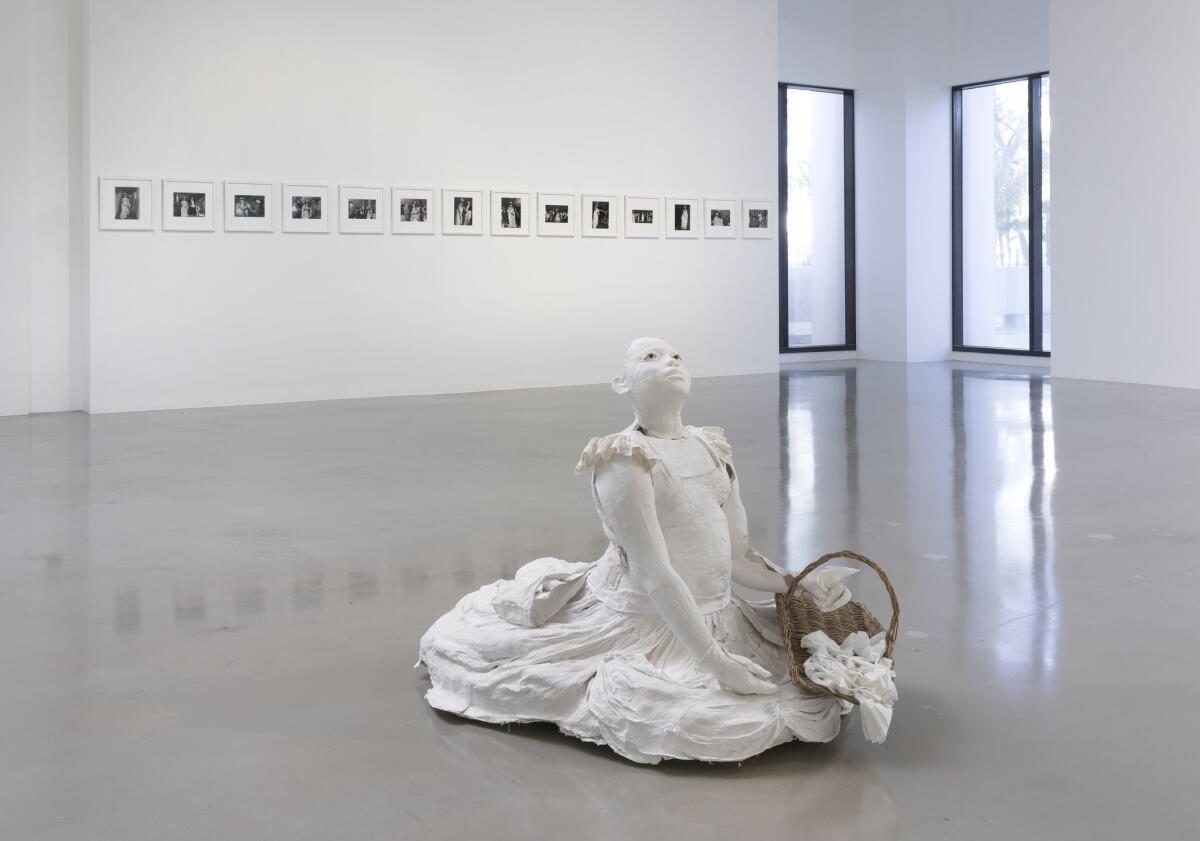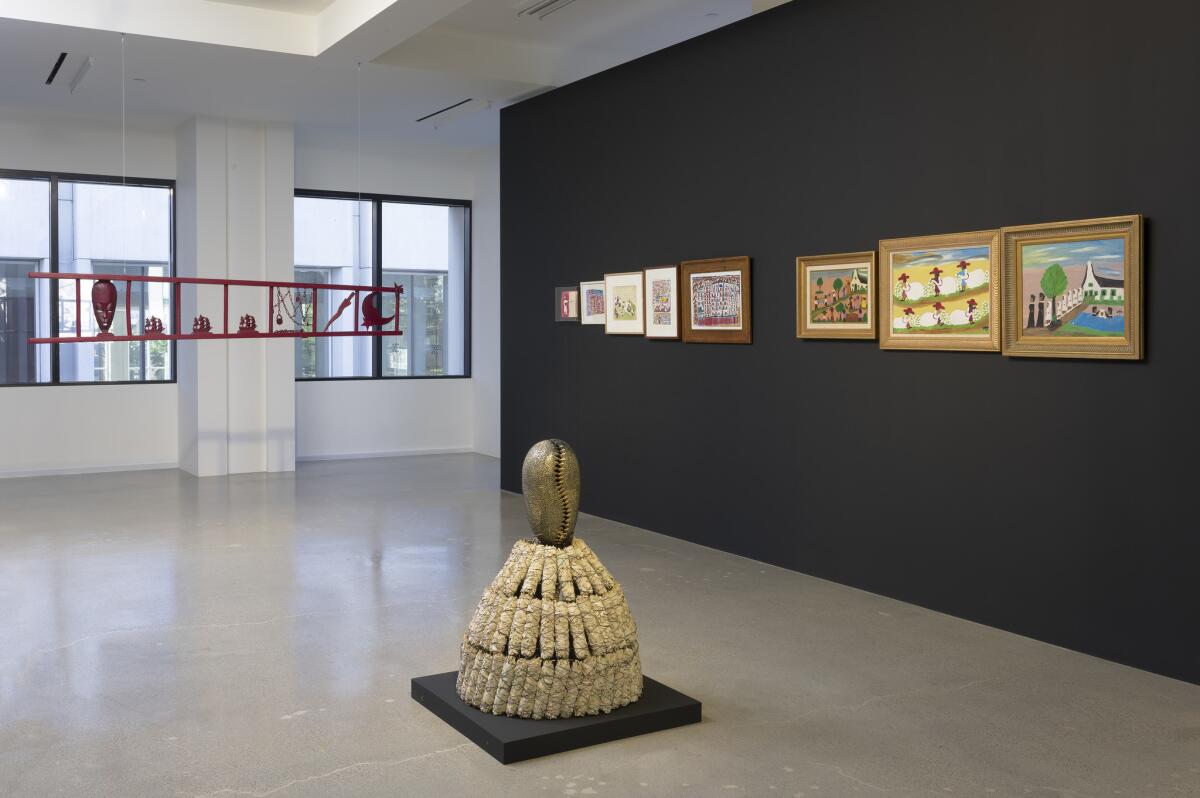Review: ‘Power: Work by African American Women’ delivers the voices of 37 artists in one fierce exhibition
- Share via
My first choice of images to accompany this review of the show "Power" at Sprüth Magers gallery cannot be published by The Times. Another strong contender has a word in its title that likewise falls outside of The Times’ guidelines for propriety.
That very inadmissability speaks to some of the fiercest varieties of power exemplified in this assembly of work by 37 African American women: power that chafes, challenges and unsettles; power that exerts pressure against the normalizing veneer of the everyday; power that counters invisibility with presence, vulnerability with strength.
One of many indelible images from the show is a photograph, part of a series of self-portraits by Brooklyn-based Nona Faustine. "From Her Body Sprang Her Greatest Wealth, Wall St." (2013) presents the artist front and center, standing on a small plywood box in the middle of an intersection in New York's Financial District. A taxi whips around the corner behind her. She faces us with sober directness, nude but for white pumps on her feet and shackles around her wrists. From a spot that once held a colonial slave market and is now the epicenter of the global market, she offers herself up for scrutiny, but her potent staging turns the scrutiny back toward us, to whatever inherited legacy charges our gaze.
Artists here treat the physical body and the emblematic body of the nation as contested sites. Historical trauma persists within both, and both serve as ready — if not always willing — vehicles for self-determination.
Sondra Perry's lush, silent video surveys the body of a "Black Girl as a Landscape" (2010). Lorraine O'Grady casts herself as Miss Black Middle-Class in a sharply satiric, photo-documented performance (1980-83). In Sonya Clark's haunting little relic, "Interwoven II" (2016), the design of the Confederate flag stubbornly ghosts the banner of the 50 states. Faith Ringgold's 1969 oil painting of the American flag (more than a dozen years past and a psychological world apart from the first of Jasper Johns’ flag paintings) tells the story slant: Its stars and stripes spell out "Die” followed by a slur aimed at African Americans.
"Power: Work by African American Women From the Nineteenth Century to Now" is a pageant of a show, dense with barbed beauty. Beverly Buchanan's "House From Scraps" (2011), a raw, ravishing tabletop assemblage in wood and copper, manages the improbable marriage of Constructivist cool and experiential grit. Paintings by Clementine Hunter and Sister Gertrude Morgan, self-taught artists from the South, share a blunt sacredness, whether representing figures at work or prayer. A show-within-the-show of early 20th-century photographs of African American life — from refreshingly genuine portraits to staged stereotypes — further thickens the conversation around representation, underrepresentation and misrepresentation.
Curated by art advisor Todd Levin, "Power" mimics a museum exhibition in scope and scale, even if it lacks its scholarly structure. Cases for lineage and conceptual or aesthetic affinity among artists are largely made visually, by means of the installation itself, helped along by a snappy little catalog that addresses the remediating function of shows curated by race and gender. To call this presentation scattershot but earnest is still to praise it; to recognize it as essential is also to lament its necessity.
Sprüth Magers, 5900 Wilshire Blvd., L.A. Through June 10; closed Sundays and Mondays. (323) 634-0600, www.spruethmagers.com
-------------
FOR THE RECORD
8:10 a.m. April 12: In an earlier version of this article, the title of Nona Faustine’s photograph "From Her Body Sprang Their Greatest Wealth, Wall St." was incorrectly rendered as "From Her Body Sprang Her Greatest Wealth, Wall St."


SIGN UP for the free Essential Arts & Culture newsletter »
Follow The Times’ arts team @culturemonster.
ALSO
Doug Aitken's 'Mirage': a funhouse mirror for the age of social media
How much is a landmark worth? A visit to Herzog & de Meuron's controversial Hamburg concert hall
L.A. Without the NEA: Series looks at what’s lost if agency gets the ax
The biggest entertainment stories
Get our big stories about Hollywood, film, television, music, arts, culture and more right in your inbox as soon as they publish.
You may occasionally receive promotional content from the Los Angeles Times.







